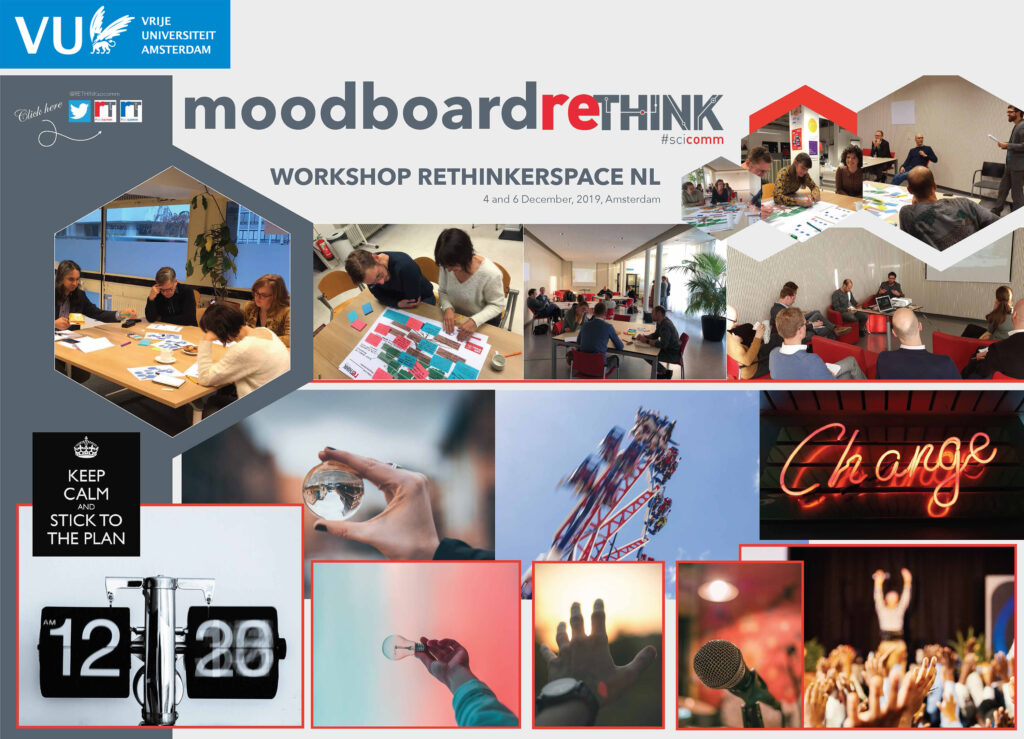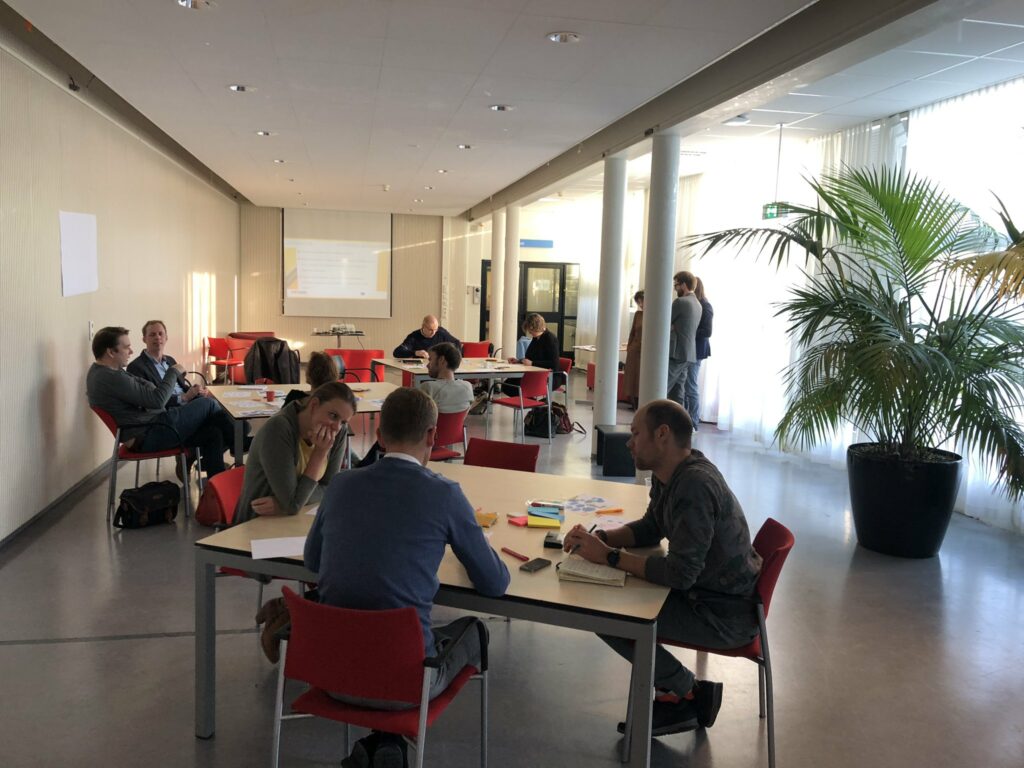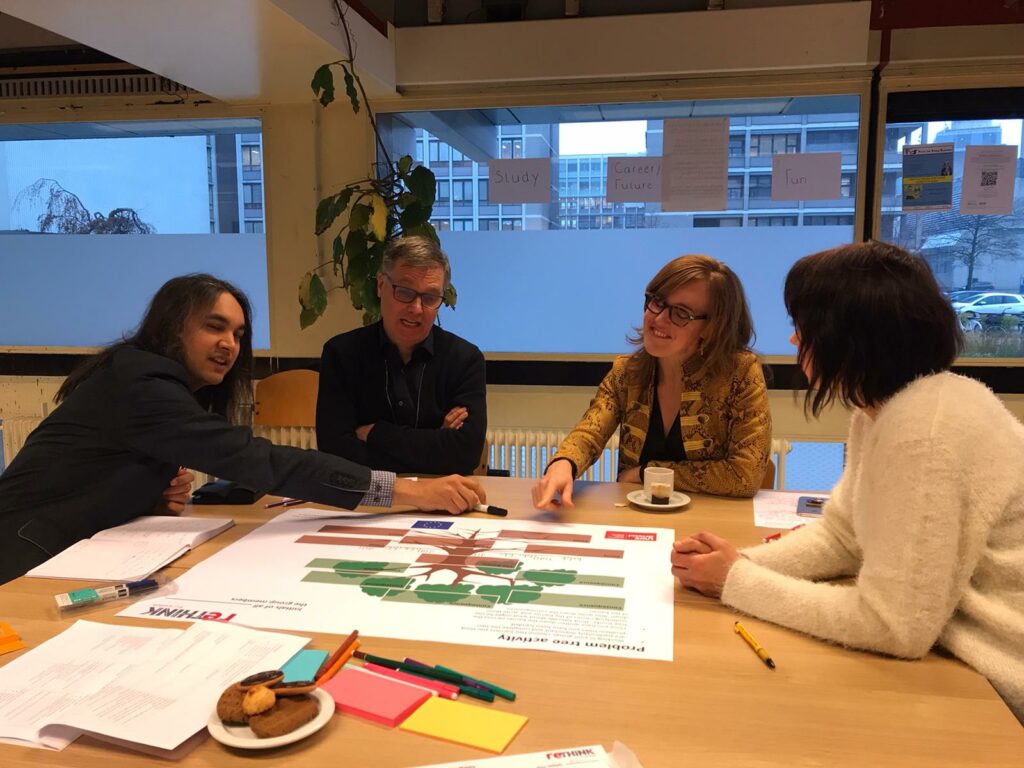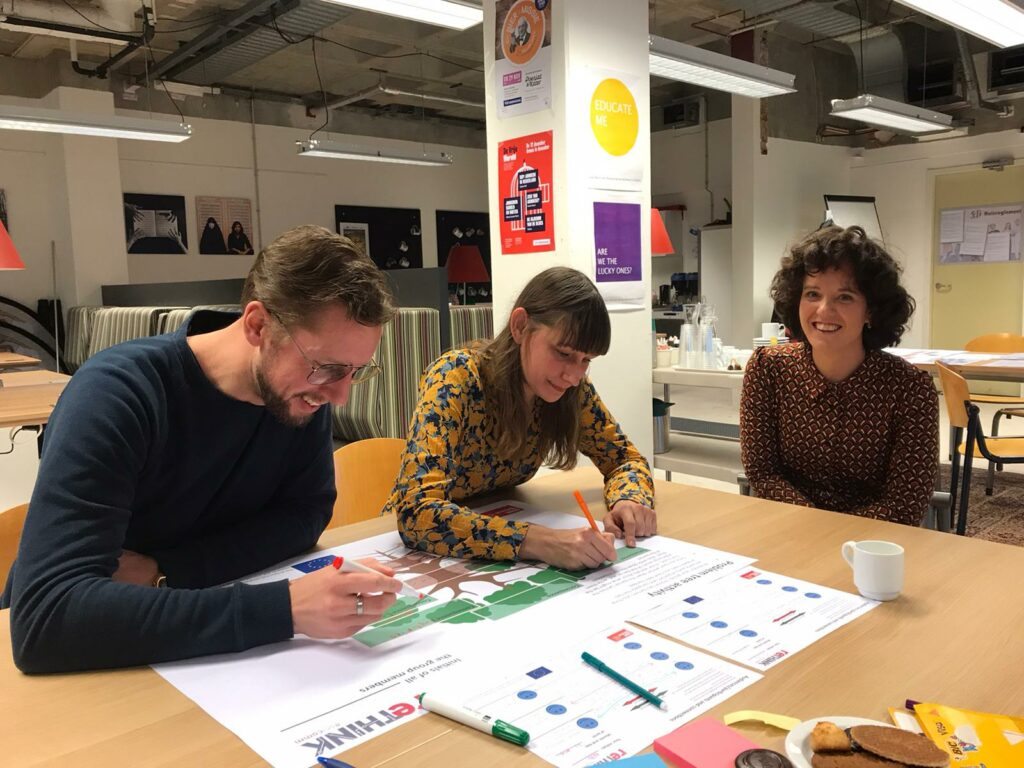
Stickers flying around, post-its RETHOUGHT, crumbled and re-written. We are well underway in discussing RETHINKing science communication: blurring of boundaries and influences of the internet. A group of science journalists, press officers, policy experts, advisors and scientists all together in one room. We are hosing our first two Rethinkerspace workshops.
WORKSHOP #1 Right away it became clear that this group of people is eager to talk about the current science communication landscape. Worksheets are enthusiastically filled in and people lively start to discuss how they see the current digitalised science communication landscape. “What do you think the main aim of science communication should be? How do you reach your audience? What is the influence on digitalisation on the way you practice science communication? What are the main challenges you encounter nowadays? What can we do together, to overcome those?”.
At times, we needed to run between the many tables, hoping to catch all interesting conversations. In a tsunami of ideas and thoughts, we captured the following table conversations: “people feel like: ‘science doesn’t relate to me?’; we should make good use of digital methods to counter disinterestedness; but sometimes it feels like we haven’t found the right way?”. In between tables, we listened to a fragmented part of a conversation on “…a fragmented media landscape”. And together, we wondered about “how do we balance between facts and emotions?”.
All in all, the day was very exciting to us. After such a long time of visualizing how this event would be, we can now bow over actual visualizations of your ideas on the science communication landscape, in the form of problem trees and overcoming barriers. With this group of people, we very much look forward to take the visualizations from the worksheets into real-life.



WORKSHOP #2 (held in two sessions). On 21 October and 9 November the VU hosted two virtual Rethinkerspace workshops. During the first meeting, we explored how Dutch citizens make sense of the unfolding Corona crisis and what we can learn from this to improve (science) communication. The second workshop addressed quality of (digital) science communication. Both workshops were lively and generated valuable input for RETHINK.
During the workshop on sensemaking the participants discussed the role of emotions and personal experiences in public debates on scientific topics. Against this backdrop, they considered the idea of ‘scientific storytelling’ as a potentially valuable skill for scientists, as well as the importance of scientists being present on and approachable via social media. One of the things that stood out from the second workshop was that ‘fostering quality in science communication can only be effective if policy and funding organisations champion the cause of quality’, a theme that resonates strongly with current discussions in the Netherlands, and accordingly also in the Dutch Rethinkerspace.
WORKSHOP #3. (June 1st, 2021). Most of the participants indicated to highly value openness and reflexivity and that they would like to learn more about it. We try/tried to capitalise on these enthusiastic responses, by finding shared interests or activities to conduct, and set-up collaborations with these individuals surrounding the topic openness & reflexivity.
However, the workshop also showed that many questions still arise, as one of the participants mentioned in her closing remarks: “It’s clear that we can make a positive improvement with openness & reflexivity. But I can’t fully grasp that one yet. How does this improve the science-society interface? What should we strive for? Do we need to convince citizens of something? Or should we strive for peaceful coexistence? Is a better atmosphere – brought about by the therapeutic value of science communication – a goal in itself? Or a means to a greater end? If so, what is this goal?”
WORKSHOP #4 Rethinkerspace members reflected on what they have learned along the way and brainstormed on what their individual and collective outputs can be beyond the project.
In this 4th Workshop the overarching theme/guiding question was how, in a moving landscape of digitization and open science, can we better match science communication with social needs? These are the main points in the attempts to answer this question:
- The communicator finds it difficult to estimate who is the recipient of content
- Who is the other? and how to reach him/her?
- Misinformation and polarization
- Abundance of information, values and voices in public debate
- The science communicator can form the bridge
Workshop #5: Sustainability of Rethinkerspaces
The final event in this series of Rethinkerspace workshops brought together all participants from the seven countries in a unique meeting focusing on experience-sharing, community building and sustainability.
Participants were involved in a series on activities with an emphasis on “speed-travels” to the 7 Rethinskerspace hubs, in which hosts presented the outcomes of their workshops on the main themes of the project: Sensemaking, quality of online science communication, openness and reflexivity and reaching underserved audiences. The hosts also invited the “visitors” from other countries to offer their perspective on the issues addressed.
These were the issues that were discussed extensively.
- Scientists involved in research are failing to understand and/or value science communication.
- Mainstream journalists are lacking the necessary scientific knowledge.
- Audiences are wide and diverse, with those involved in science communication finding difficult to locate their particular audiences and knowing what their audiences are seeking in terms of scientific information and knowledge.
- Science communication must communicate something bigger than information and knowledge: values. And this is probably its greater differentiator from pure science and knowledge transfer.
- The role of emotions in how audiences interact with science is too important to be ignored in strict positivistic approaches.
